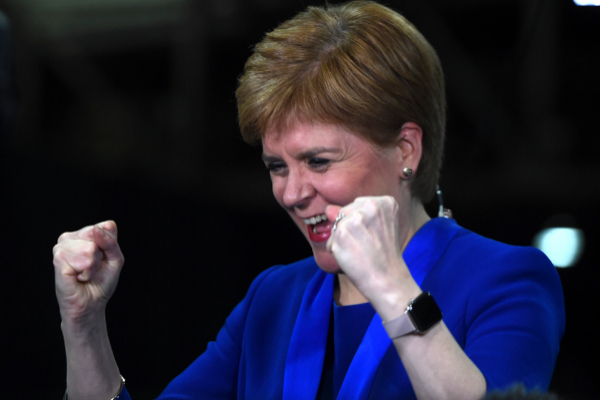- Scotland: New Scottish independence wave on the back of Brexit
- Results.Boris Johnson achieves the absolute majority to complete Brexit
- 12-D. Thus the vote has been distributed in the United Kingdom
Boris Johnson's blue tsunami crashed into Adriano's wall. Scotland punished the 'tories' with the overwhelming victory of the nationalists, who won 47 of the 59 seats in liza. Nicola Sturgeon, chief minister and leader of the Scottish National Party (SNP) took advantage of the victory to reiterate his promise of a new independence referendum in 2020: "I am not asking Boris Johnson or any other Westminster politician for permission; what I am looking for is the affirmation of the democratic right of the Scottish people to determine their future. "
The conservative wave was also diluted at the height of the Irish Sea. The pro-permanence forces, with Sinn Féin in the lead, sealed an agreement there for the tactical vote and punished in their own land the unionists, who passed from 10 to eight seats. Nigel Dodd, number two of the Unionist Democratic Party (DUP) lost in northern Belfast and the Alliance Party broke through as the third force on the new Ulster political map.
Scotland and Northern Ireland thus threaten to become the two main pitfalls of Boris Johnson in his eagerness to finish Brexit on January 31. The planned departure from the European Union has already reactivated Scottish independence and threatens to pave the way in the coming years for the reunification of Ireland, a claim that Sinn Féin has already endorsed (within five to 10 years).
Analysts have long been warning that Brexit can exacerbate internal tensions between the "four nations" (England, Wales, Scotland and Northern Ireland) and ultimately crack the United Kingdom.
"I cannot assure you that everyone who voted for the SNP is in favor of independence, but I can say that it has been an endorsement of Scotland's ability to determine its own future," Nicola Sturgeon, the second great 12-D winner: "We do not have to abide by a conservative government that we do not choose or accept life as a nation outside the EU."
"In an independent Scotland we will always have the governments for which we vote and the total control of our powers, to have a more just and prosperous country," Srugeon added, curiously paraphrasing Johnson's populist discourse to justify the culmination of Brexit. "We can take our place as a partner that deserves to be treated equally, with our closest friends in the United Kingdom and in Europe."
The SNP won 11 seats with respect to the 2017 elections, although it failed to emulate the success of the 56 seats achieved in 2015, a year after the independence referendum in which the tenure in the United Kingdom won by 10 points. The polls continue to favor the 'no' to independence by almost the same margin (55% to 45%), but the Brexit factor has meant a realignment of the vote and confirmed that Scotland is 'different' (after all , 62% of the population voted for permanence in the EU).
The SNP swept the Labor Party from the map, relegated to a sad deputy: Ian Murray. The debacle of what was the majority force in Scotland (led by local idol Tony Blair) was even more obvious than the foreseeable fall of the Conservative Party, which went from 13 to six deputies (and paid dearly for the resignation of local leader Ruth Davidson). The Liberal Democratic Party also suffered the blow with the defeat of Jo Swinson in its Scottish district of East Dunbartonshire, which forced his instant resignation as leader.
After the impulse at the polls, Nicola Sturgeon promised to speed up the paperwork before Christmas for the call for a second independence consultation in 2020. Boris Johnson spoke yesterday by phone with Sturgeon and reiterated his "opposition to a second independence referendum and its purpose to strengthen the union, " a Downing Street spokesman said. The 'premier' stressed that the result of the 2014 sovereign consultation (55% to 45% against independence) "was decisive and must be respected."
In Northern Ireland, meanwhile, the political map is even more complex, also taking into account that the situation of "misgovernment" that has been going on for two and a half years, due to the inability of the DUP unionists and the Sinn Republicans Fein to form a unity government (and under the renewed threat of terrorism).
The leader of the DUP, Arlene Foster, has come out very touched of the elections and has lost the privileged position that had its party with its temporary alliance with the conservatives during the last two years. Foster called Boris Johnson "traitor" in the election campaign because he believes that his Brexit agreement sacrifices Ulster and involves the creation of an internal customs office in the Irish Sea.
The resentment of the unionists towards Johnson can play in the end in favor of the cause of the reunification that defends Sinn Féin leader, Mary Lou McDonald. The 12-D elections have served, among other things, to confirm the viability of a hypothetical collaboration between Sinn Féin, the Alliance Party and the Social Democratic and Labor Party (SDLP) as a counterweight to the unionists.
According to the criteria of The Trust Project
Know more- Boris johnson
- United Kingdom
- Europe
- European Union
- Scotland independence
Elections in the United Kingdom The next steps of Boris Johnson: forming a new cabinet, voting in Westminster and completing Brexit
United Kingdom: Johnson defeats Corbyn by the minimum in the first television debate for Brexit elections
United Kingdom Jeremy Corbyn accuses Boris Johnson of wanting to sell the British health system to the United States

